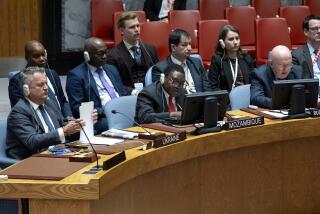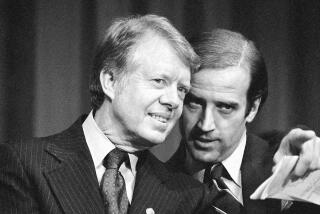Reagan Widening of Rights Issues Could Cause Friction
- Share via
MOSCOW — With arms control negotiations temporarily on the back burner, the always-sensitive issue of human rights has moved up on the agenda of the summit talks that began here Sunday between President Reagan and Soviet leader Mikhail S. Gorbachev.
And despite the two leaders’ amicable opening discussions of the subject inside the Kremlin, human rights is likely to become a source of increasing friction between the superpowers, because Reagan last week expanded his complaints into areas Moscow considers primarily domestic and thus far more sensitive.
In the past, according to American experts, U.S. criticism of Soviet human rights performance centered on such relatively “international” issues as Jewish emigration and the often-brutal persecution of dissidents.
Now the Reagan Administration has begun to press for changes on such fundamental matters as the role of courts in the Soviet legal system and even the Soviet Union’s single-party system.
As a result, Kremlin charges that the Reagan Administration is meddling in Moscow’s internal affairs are likely to grow sharper.
Indeed, Soviet spokesman Gennady I. Gerasimov said pointedly Sunday, after human rights dominated the first Reagan-Gorbachev session, that “we suggested President Reagan does not have a concrete understanding where the human rights issue stands in the Soviet Union.”
Reagan, in the speech he delivered in Helsinki, Finland, on Friday, signaled his new and broader definition of human rights by calling for greater political freedoms for the Soviet people. This goes well beyond the traditional civil liberties that have been the subject of human rights issues in the past.
Among the internal political freedoms Reagan called upon the Kremlin to embrace were independent judicial and legislative branches of government. He also urged “a commitment to pluralistic democracy”--that is, a system of multiple political parties instead of the Communist Party monopoly that has been at the heart of the Soviet system since the Bolshevik Revolution in 1917.
In urging Moscow to adopt what amounts to the three-branch system of government embodied in the U.S. Constitution, Reagan was joining an internal debate already under way here and siding with a group of Soviet reformers who have begun advocating adoption of some of these features of Western democracies.
Reagan’s call for a multiparty political system went even further, since Gorbachev has already drawn the line against political pluralism, both in words and deeds. An embryonic political party, the Democratic Union, was crushed here two weeks ago in a clear demonstration of where the Soviet leader draws the line on perestroika, or restructuring.
Demonstration in Leningrad
That opposition was demonstrated again on Sunday with a report from Leningrad that police broke up a demonstration by 2,000 people that was organized by the Democratic Union. A spokesman for the union said police punched some of the demonstrators and detained about 35 of them.
Gorbachev himself, in welcoming Reagan to the Kremlin, sought to play down the subject of human rights. He called upon Reagan to help him make “responsible judgments” about regional, economic and “humanitarian problems,” using the Soviet-preferred term for the issue of human rights.
Earlier, a U.S. official confirmed that arms control issues, including negotiations toward a strategic arms reduction (START) treaty, “will not be as important as before at the Gorbachev-Reagan level,” although the two leaders’ aides will strive to make progress at the working level.
At the same time, the U.S. official acknowledged that Reagan has significantly widened the thrust of his human rights campaign to cover political issues, even using economic arguments to make his point.
This expansion appeared first in a Reagan interview last week with the Soviet magazine Ogonyok when he said, in written answers to prepared questions, that “as long as Soviet society remains off limits to the rest of the world, inhibiting the free flow of information and restricting travel in and out of the U.S.S.R., your economy will be limited in its ability to be part of the world economy.”
Tense Exchanges on TV
And in a Soviet television interview marked by tense exchanges, the President lectured the Soviets that while their constitution specifies that the government provides the privileges and rights that the people enjoy, in the United States “the government can do nothing that is not prescribed by the people in the Constitution.”
But he most clearly broke new ground in Helsinki where, in commemorating the 1975 Helsinki Accords on security and cooperation in Europe, he said “the common European home” that the Soviets have emphasized goes beyond geography.
The agreement, which all European states and the United States are pledged to support, includes “a commitment to true pluralistic democracy,” Reagan said.
He called upon the Soviets to give “legal and practical protection to free expression and worship,” and he said the only way to guarantee such protection is to ensure the independence of the courts in carrying out the laws. Also, he said, popular rather than one-party control over those who make the laws provides a further guarantee of human rights.
“So does the secret ballot. So does the freedom of citizens to associate and act for political purposes or for free collective bargaining,” he added, in challenging Gorbachev to embrace all aspects of Western democracy in carrying out his political and economic reform here.
More to Read
Sign up for Essential California
The most important California stories and recommendations in your inbox every morning.
You may occasionally receive promotional content from the Los Angeles Times.










